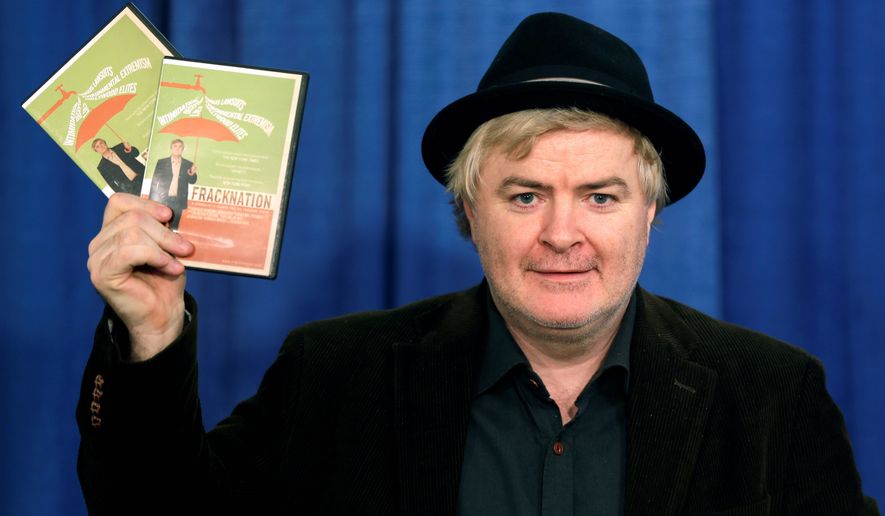Phelim McAleer, the Irish documentary filmmaker who challenged Al Gore’s “Truth” on climate change, has embarked on a theatrical work that has all the trappings of grand drama.
Corruption. Celebrity. And fraud. Lots of fraud.
Mr. McAleer’s new play, “The $18 Billion Prize: The Dark Side of the Environmental Movement,” chronicles the 1993 class-action lawsuit against Chevron Corp. that accused the oil giant of vast pollution of land and waterways in rural Ecuador. After eight years of legal wrangling — first in a New York state court and then a federal court — Chevron lost and was ordered to pay $18 billion to the complainants.
But that was just the beginning.
Mr. McAleer, the playwright, relies on court transcripts and related documents, such as diaries kept by attorneys, to tell the full story. Roughly 80 percent of the dialogue in “The $18 Billion Prize” is lifted directly from those records and journals.
“Real life is much more compelling than fiction,” the right-leaning provocateur told The Washington Times. “The audience pays a lot more attention when they realize it’s verbatim, when you realize it’s the real person’s real world.”
He applied the tenets of verbatim theater in his 2015 play, “Ferguson,” in which actors recited grand jury testimony in the investigation of a white police officer’s fatal shooting of an unarmed black teenager in a St. Louis suburb in 2014. Part of the cast quit the show just before its debut in New York City after learning of the playwright’s political leanings. They feared the show wasn’t truthful to the events in question.
Mr. McAleer, who has been hailed as conservatives’ answer to Michael Moore, brushes off the complaints and criticism.
“There doesn’t have to be anything to complain about. … They just shout, ’Racist!’” he said.
In his work as a playwright and as a documentarian, the contrarian storyteller exudes a kind of comfort in controversy, whether he courts it or whether it just follows him.
Such was the case with his 2009 documentary, “Not Evil Just Wrong,” which he produced and directed with his wife and longtime collaborator, Ann McElhinney. In it, the doubtful duo picked apart the themes of the former vice president’s Oscar-winning 2006 documentary, “An Inconvenient Truth,” noting that evidence of global warming is inconclusive and arguing that many environmental laws have proved harmful to humans.
Liberal scolds such as Mother Jones magazine assailed the McElhinney-McAleer film, but conservatives rallied around it. Competitive Enterprise Institute President Fred Smith declared, “We may at last be getting our Michael Moore.”
The pair also did battle with Josh Fox, director of “Gasland,” a 2010 documentary that savaged the fracking industry. Ms. McElhinney and Mr. McAleer responded with “FrackNation,” a 2013 documentary challenging Mr. Fox’s arguments and extolling the virtues of the energy process. It enraged liberals and environmentalists. ThinkProgress.org said Mr. McAleer used the “Tobacco Playbook” to attack Mr. Fox when his “Gasland Part II” hit theaters in 2014.
Though fond of documentaries, Mr. McAleer said the play format allows him to tell a story without the costs of a feature film. The medium also brings with it a sense of storytelling gravitas.
“People respect plays. It’s a more interesting art form, and they’re an excellent way to tell the truth,” he said.
“The $18 Billion Prize” focuses intently on what happened after Chevron lost the pollution lawsuit in 2001 and refused to pay.
New York lawyer Steven Donziger filed the lawsuit on behalf of Ecuadoreans impacted by environmental degradation, claiming Chevron was responsible in its partnership with a state-owned oil company (now named Petroecuador).
In the wake of his victory over the oil giant, Mr. Donziger appeared in the 2009 documentary “Crude,” which celebrated the verdict while providing details about various aspects of the case.
Team Chevron spotted a revealing scene omitted from the theatrical version of “Crude” but released online. It showed Mr. Donziger collaborating with allegedly neutral experts in the case. Chevron successfully demanded to see more footage compiled by the movie’s director, Joe Berlinger.
Soon, a large, sticky web of deceit emerged, including bribery and money laundering.
In 2014, a federal court in New York found that Mr. Donziger committed witness tampering, money laundering, extortion and wire fraud while attempting to win his case. His attempt to revive the legal fight failed at the Supreme Court last year.
“He was brought down by his own hubris,” Mr. McAleer said of Mr. Donziger.
Meanwhile, the diaries cited in this “Prize” offer some juicy tidbits theatergoers will have to see for themselves. The case attracted several high-profile celebrities, including Danny Glover, Mia Farrow and Sting and his wife, Trudie Styler. The pop star and his wife appeared in “Crude.”
“Let’s just say Sting and his wife will not be happy with this play,” said Mr. McAleer, suggesting that the production will include some sexual revelations from the diaries.
“The $18 Billion Prize” is set to debut Saturday at San Francisco’s Phoenix Theater and run through June 3.




Please read our comment policy before commenting.